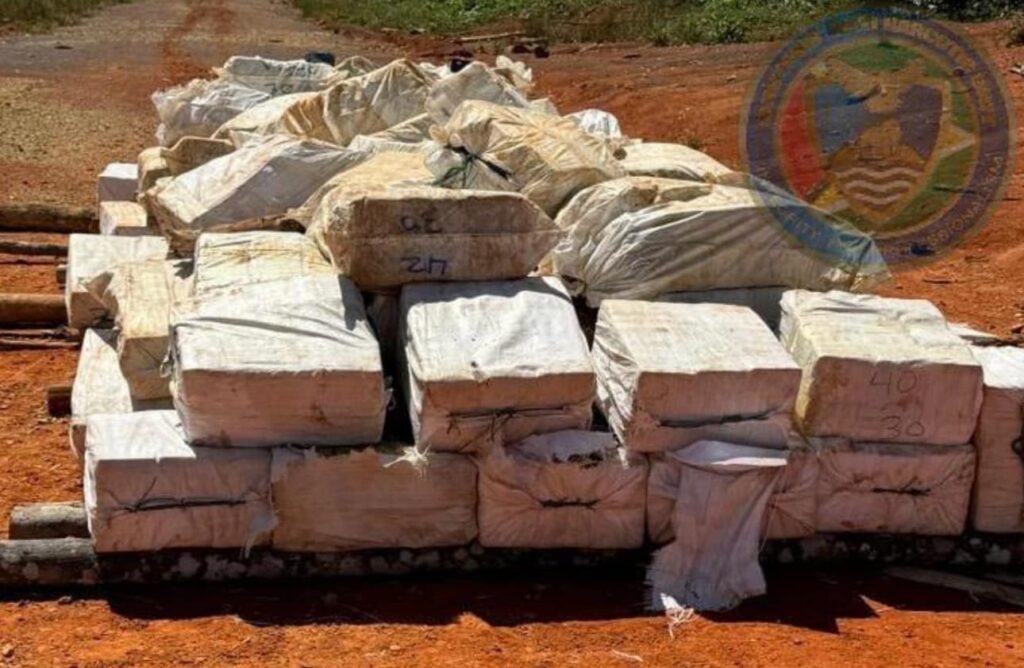
The US Treasury Department’s Office of Foreign Assets Control (OFAC) has released details on the reasons behind its sanctioning of four Guyanese nationals and two Colombian nationals, who the office says, are responsible for trafficking tons of cocaine from South America to the United States, Europe, and the Caribbean.
On the sanctioned businessmen Paul Daby Jr. and Randolph Duncan, the US Government said the two operate the largest drug trafficking organizations in Guyana and rely on maritime vessels and aircraft to conceal and traffic cocaine, while also allegedly bribing Guyanese officials to facilitate their drug trafficking operations.
According to the report from OFAC, Daby Jr. is known for trafficking ton-quantities of cocaine, coordinating the shipment of loads from Colombia and Venezuela via aircraft, and utilizing illegal airstrips in Guyana. The report also noted that Daby Jr. also relies on a network of individuals to conceal and transport cocaine in shipping containers from the ports of Guyana and Suriname, adding that he is also involved in the transporting of illegal gold from Guyana via maritime vessels.
In the case of Randolph Duncan, the US Government said he traffics cocaine from Guyana to Africa and the Caribbean, with Europe and the United States as the ultimate destinations.
The report said Buxton resident, Mark Cromwell, who is also a former Guyana Police Force (GPF) officer, is a violent drug trafficker and associate of Daby Jr. The US Government reminded that Cromwell is wanted by the Guyana Police for his connection to the 2024 abduction of a former Guyanese police officer.
Meanwhile, the report also details that Guyana Police Senior Superintendent, Himnauth Sawh (Sawh), ensured safe passage to Colombian and Venezuelan drug traffickers through Region One.

The report noted that in September 2024, following the discovery of 4.4 tons of cocaine in Region One by Guyanese officials, Sawh was removed as Divisional Commander of Region One and assigned to the GPF’s Transport Workshop. He was later assigned to another section of the Police Force, and has been sent on administrative leave in wake of the sanctions.
The sanctioned, Colombian nationals, Yeison Andres Sanchez Vallejo (Sanchez) and Manuel Salazar Gutierrez (Salazar), are responsible for overseeing the clandestine airstrips used to transport ton-quantities of cocaine via aircraft from Colombia to Guyana, the OFAC report stated.
OFAC said the sanctions targeted drug traffickers utilizing boats and narco-subs to traffic ton-quantities of cocaine, along with an alleged corrupt Guyanese law enforcement official.
The sanctions, the report noted, also targeted individuals that are operating covert airstrips to traffic drugs via aircraft.
It said for decades, reported corrupt actors have used Guyana as a transshipment point for the movement of drugs from South America to the United States, with Mexican drug cartels also maintaining a presence in the region. International cocaine trafficking remains a serious threat to the United States, as the substantial profits generated from these sales continue to fund and strengthen cartel operations.
The sanctions have been described by the US Government as a strong signal that the Donald Trump administration will continue to take the fight to the cartels, regardless of where they are located, the US Deputy Secretary of the Treasury Michael Faulkender said.
He added that “Treasury will continue to expose the criminal networks that allow for drugs to be trafficked into the United States, and work closely with our law enforcement colleagues and the Government of Guyana to disrupt the cartels wherever they operate.”
The sanctioning action was taken pursuant to Executive Order (E.O.) 14059, which targets the proliferation of illicit drugs and their means of production. OFAC carried out this investigation in coordination with Homeland Security Investigations (HSI), U.S. Customs and Border Protection (CBP), the Drug Enforcement Administration (DEA), and the U.S. Department of State’s Diplomatic Security Service (DSS).
The report said in the last few years, Guyana has been the focus of major law U.S. enforcement operations in partnership with Guyanese authorities, resulting in multi-ton seizures of cocaine. In March 2025, a cargo vessel originating in Guyana was discovered by police in the waters of Trinidad and Tobago with approximately 182 kilograms of cocaine.

Cocaine packages stamped with the Toyota logo, a known trademark of the Sinaloa Cartel, were found on-board the cargo vessel. Mexican drug cartels are known for having a presence in Guyana, the report noted.
It said on February 20, 2025, the State Department identified the Sinaloa Cartel as a Foreign Terrorist Organization (FTO) and as a Specially Designated Global Terrorist (SDGT).
On March 21, 2024, U.S. and Guyanese law enforcement seized 2,370 kilograms of cocaine in a self-propelled semi-submersible approximately 150 miles off the coast of Guyana.
In August 2024, Guyanese authorities, with support from DEA and DSS, discovered 4.4 tons of cocaine in a clandestine airfield in the northwest region of Guyana known as Barima-Waini, or Region One, which shares a border with Venezuela. The cocaine was buried in underground bunkers about six feet deep.
As a result of the US sanctions, the Treasury Department said all property and interests in property of the designated or blocked persons that are in the United States or in the possession or control of U.S. persons are blocked and must be reported to OFAC.
It further stated that any entities that are owned, directly or indirectly, individually or in the aggregate, 50 percent or more by one or more blocked persons are also blocked.
According to the report, unless authorized by a general or specific license issued by OFAC, or exempt, OFAC’s regulations generally prohibit all transactions by U.S. persons or within (or transiting) the United States that involve any property or interests in property of blocked persons.
Violations of U.S. sanctions may result in the imposition of civil or criminal penalties on U.S. and foreign persons, the report stated.













You must be logged in to post a comment Login